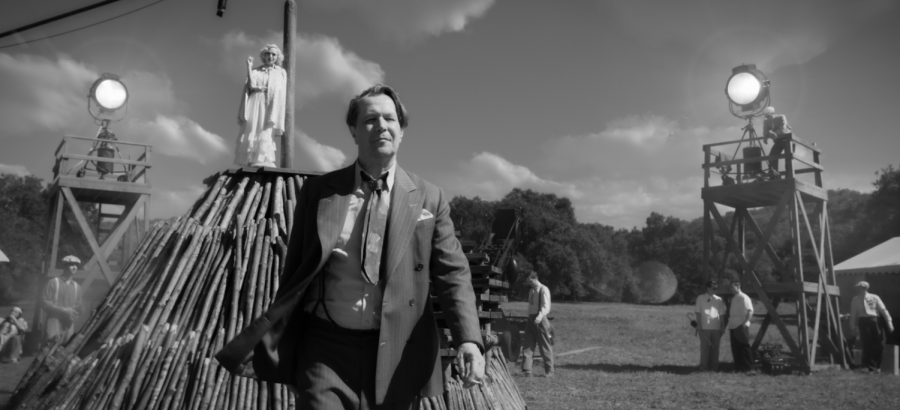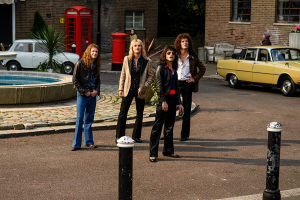“Mank” (2020): A pretty good movie about a guy writing a great movie
A unique and talented artist makes just another biopic
Gary Oldman as Herman J. Mackiewicz stylishly walking away from a fire hazard in “Mank”.
December 6, 2020
After an unbearable five year hiatus from directing feature films, David Fincher has finally graced us with his take on the writer of one of the most well respected movies ever made. My verdict? He should’ve just made season three of “Mindhunter” (2017-present). That’s not to say that “Mank” isn’t worthy of existence, mind you -I actually quite enjoyed myself- but from a director as distinguished as Fincher, “quite enjoyed” doesn’t really hit the mark. I think “Mank”’s biggest problem is that it neither adequately honors the legacy of “Citizen Kane” (1941) – which it so unashamedly drools over – nor brings enough new ideas to the table to roll out from under the shadow of other better films about writers like “Adaptation” (2002) or “Mishima: A Life in Four Chapters” (1985).
“Mank” follows one Herman J. Mankiewicz (though he goes by “Mank”) while he’s holed up in a secluded house in the process of writing “Citizen Kane”, which is widely regarded as one of the best movies ever made. In what seems to be a cheeky nod to the movie being written, the film follows a sort of ping-pong structure, jumping between scenes of Mank writing his screenplay and his life leading up to his current position. Over the course of the film, you get a veritable sightseeing tour of names, places, and historical events which would make fans of “Kane” or even just the 1930s and 40s squeal. Characters have a lively discussion about this up-and-coming “Hitler” fellow, Bill Nye plays Upton Sinclair as he fails to get elected governor, and Tom Burke gives a shoddy Orson Welles impression for a couple minutes. All of this almost makes you forget that the movie you’re watching has a pretty mediocre script at the end of the day.
The only writing credit of David’s late father Jack Fincher, the script was supposed to be produced in the 90s, but hadn’t found footing until David picked it up in 2019. Knowing this film must be very personal to the director, it makes me feel mean when I say that I don’t think the script is all that good. Mank himself is generally quite entertaining, but he never really grows. Mank at the beginning is the same as Mank at the end, except now he’s written his movie. There aren’t really any overarching themes to latch onto, Mank never really has to struggle when making what everyone claims is a totally brilliant script, and then the movie just ends like every other lame biopic I’ve seen in the past five years.
As much as I’ve been hamming on this movie, I still really enjoyed it. What carries the movie is mostly the performances (disregarding Tom Burke) and presentation. Gary Oldman plays quite the charismatic Mank, and I was at the edge of my seat waiting for him to get into another conversation where he’d be able to outwit his adversary. The movie also looks exceptionally pretty, with deep blacks and bright whites making everything pop. My one qualm with the visuals is that Fincher, who always shoots on digital because of his insistence on doing many takes, decided to make the movie look like it was from the 40s. To do this, he puts an unconvincing film grain filter over the image, and occasionally inserts fake imperfections in his fake film stock. What puzzles me most about this decision is that the film is still in a wide aspect ratio, even though it certainly would’ve made more sense visually if he shot it in the standard 4:3 of the time.
What makes “Mank” so unsatisfying to me, apart from the unsatisfying ending, is that it seems to rely on the same crutches that any other biopic of a famous artist does. While “Mank” never becomes something as disrespectful as “Bohemian Rhapsody” (2018), it ultimately just feels like any other biopic. So instead of a recommendation, I come to you with, well… a recommendation for a different movie. Spike Jonze’s perplexing and hilarious “Adaptation” is everything “Mank” wishes it could be. It follows “Being John Malkovich” and “Adaptation” screenwriter Charlie Kaufman, as he toils away at writing the script for “Adaptation”. This darkly comedic and incomprehensibly meta take on the writer biopic is thoroughly dashing, and I’d highly recommend it over “Mank” anytime. Check it out!









